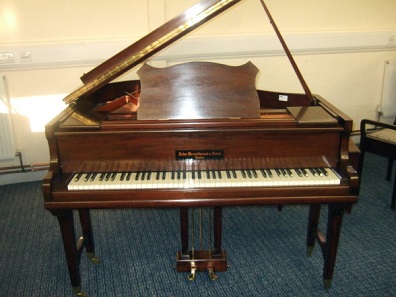by Annika Backe
translated by Christina Schlögl
April 27, 2017 – It is not news that one can still find surprising things, even after Easter is over. But piano tuner Martin Backhouse surely did not expect to make this very find in Shropshire, England shortly before Christmas of 2016. The 61-year-old found more than 900 carefully wrapped gold coins inside a piano.
A piano from the renowned house John Broadwood&Sons, London, ca. 1929. Photo: pianomap/Wikimedia Commons / CC BY 2.0
The treasure, which was immediately reported, was hidden inside an instrument of the company John Broadwood&Sons, London. Founded in 1738 by Burkhardt Tschudi, the business is one of the oldest and most esteemed piano makers in the world. Their pianos, which were played by the great Mozart and Beethoven, are even purchased by the English royal family.
The Piano
Since it would seem unlikely that the treasure was meant as an accompaniment to the piano, investigations focused on the individual owners of the instrument over time. The first one to buy the piano was a music shop in Saffron, Walden, Essex in the year 1906. The next known date is 1983, when the piano was bought by a local family. When their estate was sold, the current owner, a communal group of Shropshire, got it as a gift. And they provided it for the local community college Bishop’s Castle.
Treasure or no treasure…
Investigations tied together at the Portable Antiquities Scheme (PAS), located at the British Museum. Their curator Ian Richardson and the responsible contact person of the PAS, Peter Reavill, have never experienced a find like this before. There were 913 gold coins, wrapped in leather pouches and burlap bags. The coins were identified as 633 sovereigns and 280 half sovereigns from the time between 1847 and 1915.
After the coins were documented, the local coroner investigated whether the find could be classified as a “treasure” according to the “Treasure Act” of 1996. This would be the case, if the owner had intentionally hidden it and said owner could no longer be traced.
After the deadline to claim the treasure had gone by and no owner or his/her heirs had spoken out, the coroner declared the hoard a treasure on 20 April 2017. Thus the find was given to the English crown and can now be sold. The owner of the piano as well as the piano tuner will get a share of the sales proceeds. Meanwhile the school can enjoy a well-tuned instrument and piano tuner Martin Backhouse will keep enjoying his work, where good eyes sometimes do in fact pay off.
Here is a video on the find and the youngest developments of the case.
You will find more information on the regulations of treasure finds in England on the Website of the Portable Antiquities Scheme.
And you will also find current news on finds there.
This is the homepage of John Broadwood&Sons, London.
CoinsWeekly recently reported on a trouvaille, children made when playing in the Bavarian town Pocking.





